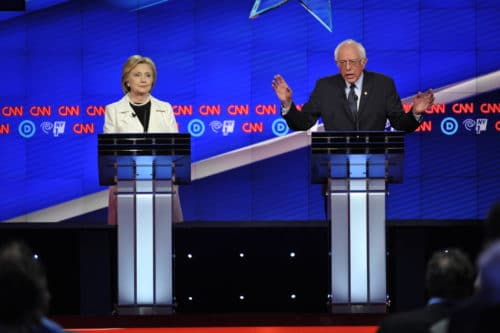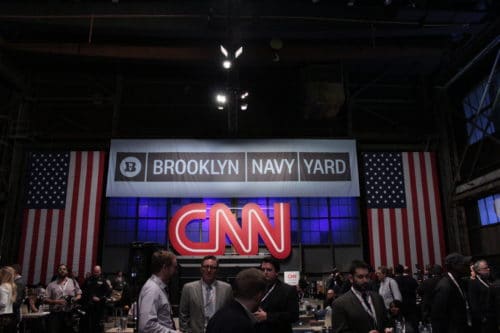Democratic candidates Hillary Clinton and Bernie Sanders squared off during the April 14 Brooklyn debate. The two came ready to debate, but what ensued resembled a 12-round boxing match between two opponents that have met each other in the ring a few times before.
The location: The Brooklyn Navy Yard – which employed 70000 workers at its peak in World War II and was nicknamed “The Can-Do Yard”. The participants: a scrappy, hometown candidate named Bernie Sanders and a familiar former New York senator named Hillary Clinton. The stakes: 291 potential delegates to be divvied up based on the results of the April 19 New York primary.
The candidates started their Brooklyn bout with their opening statements. Sanders basked in the audience’s support as some crowd members shouted out Sanders’ $27 average donation line along with him. Clinton equally felt the crowd’s favor when she opened with her experience with being New York’s one-time senator.
The real fight began as soon as the opening statements ended. Sanders began with a combination of jabs which called Clinton’s judgment on a variety of issues – from the Iraq War to voting for trade agreements – into question. Clinton brushed the initial flurry off and countered by using Sanders’ interview with the New York Daily News, which endorsed Clinton, to call Sanders’ judgment into question.
Clinton and Sanders let the debate devolve into a shouting match as each questioned the others judgment. Clinton clutched President Barack Obama record to defend her own decisions, and the first line of questioning came to an end.
The two candidates went on the offensive as each tried to prove they were the tougher candidate on Wall Street, but Sanders landed the first real blow of the night.
“Secretary Clinton called [the banks] out. Oh my goodness, they must have been really crushed by this. And was that before or after you received huge sums of money by giving speaking engagements?” Sanders said.
The debate shifted to the minimum wage and the candidates’ responses highlighted differences in style. Clinton said, “Going from $7.25 to $12 is a huge difference. 35 million people will get a raise. One in four working mothers will get a raise. I want to get something done.” Sanders, on the other hand, advocated for a $15 federal minimum wage.
Clinton was able to put Sanders on the ropes for the first time during the debate by pouncing on the gun control issue. Clinton accentuated the fact that Sanders voted against the Brady Bill five times and that the National Rifle Association (NRA) helped Sanders get elected to Congress in 1990. Again, Clinton went back to the Daily News interview to show that Sanders was unwilling to hold gun manufacturers criminally liable in the wake of mass shootings.
Environmental issues were put in the spotlight as the two Democratic candidates debated fracking. Clinton favored fracking to produce natural gas as a “bridge fuel” to get away from dirtier fossil fuels, while Sanders proposed a ban on fracking. Once again, Clinton’s pragmatism was pitted against Sanders’ idealism.
Clinton and Sanders entered the final round of the debate and the discussion shifted to foreign policy. Sanders repeatedly hit Clinton on her eagerness for regime change in Libya without a plan for the future, and Sanders combined those attacks to point to Clinton’s larger interventionist foreign policy.
Meanwhile, Clinton attempted to portray herself as the bigger supporter of Israel. Clinton flashed back to her experience with trying to negotiate peace between the president of the Palestinian Authority and Israel’s prime minister. After Sanders tried to criticize Clinton’s way of going about negotiating peace, Clinton parried by saying “describing the problem is a lot easier than trying to solve it.”
The debate ended and both candidates were left standing. Neither Clinton or Sanders were able to land a knockout punch on the other. In a split-decision, Sanders may have not been able to do enough to make up for a 13.3 point deficit in the polls heading into New York’s April 19 primary.




